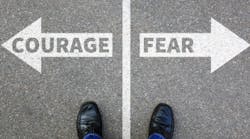Overcoming failure in order to succeed in your dental assisting career
Most days I fail at something. Some days it’s making my bed, most days it’s following the speed limit, and once in a blue moon it’s not taking time for myself to rejuvenate. I overcome most of these failures easily and don’t second guess myself—OK, maybe I do when I get a speeding ticket, but that hasn’t happened since 2003!
When I interact on a variety of social media sites, it makes me sad to see fellow dental professionals struggling with failure. For some, it’s because they’re new to the profession. For those in midcareer, it may be their failure to easily catch onto something new. For those of us at the tail end of our careers, it may be not knowing how to move forward after a particularly difficult struggle. The most important thing to remember in any of these situations is that you are not alone!
Many of us are afraid of failing sometimes, but we mustn't let that stop us from moving forward. Fear of failure can have several causes, from childhood events to mistakes we made. It's important to realize that we always have a choice: we can choose to be afraid, or we can choose not to be afraid so that we can move forward.
Part of the reason I am the way I am today is because as a child I was often told “No” or “Girls can’t do that.” Early on this led me to become an overachiever and to toe the line of limits. Each time I was told no, I found a way to overcome the challenge. As a result, this molded me into a very driven and determined dental professional, which can be either good or bad depending on how you look at it.
For many of us, the fear of failure stops us in our tracks. Have you ever been so afraid of failing that you took the easy way and didn’t try at all? Or has the fear of failure meant that, instinctively, you undermined your own efforts to avoid the possibility of a bigger failure? Been there done that, numerous times! Many of us have probably experienced this at some point. The fear of failing can be crippling and cause us to do nothing, to second guess ourselves, and therefore resist moving forward. But when we allow fear to stop our forward progress, we're likely to miss some great career opportunities. So, why are we so afraid of failure?
To find the sources of fear of failure, we need to understand what failure actually entails.
We all have different definitions of failure, because we all have different standards, values, and belief systems. These are who we are. A failure to one person may simply be a great learning experience for someone else. As an educator, I call these “teaching moments.” Someone else might call them a Kodak moment.
Fear of failure can be linked to many causes. For example, judgmental or discouraging parents is a causative factor for some. Because they were routinely undermined or humiliated in childhood, they carry those negative feelings into their personal and professional lives. Experiencing a traumatic event can also be a cause. For example, say that several years ago you gave an important presentation in front of a large group and did very poorly. The experience might have been so terrible that you became afraid of failing in other things. You carry that fear even now, years later, and cringe every time you have to speak in front of others.
There are a number of possibilities for fear of failure, and they not limited to the following:
• Patterns from childhood or young adulthood—Hyper-critical adults can cause children and young adults to internalize damaging mindsets. This pattern of negativity is difficult for some to overcome. For others, patterns of intentionally being set up for failure may be the cause, and rightfully so.
• Perfectionism—The desire to be seen as perfect can cause some to fear anything that would potentially damage their image. Perfectionism, after all, is ultimately a self-defeating way to move through life. It is built on an excruciating irony: making, and admitting, mistakes is a necessary part of growing and learning and being human. It also makes you better at your career, relationships, and life in general. By avoiding mistakes at any cost, a perfectionist can make it harder to reach his or her goals. But the drawback of perfectionism isn’t just that it holds someone back from being their most successful and productive self. It doesn’t mean each generation is becoming more accomplished. It means we’re becoming sicker, sadder, and are undermining our own potentials.
• Over-personalization and lack of self-confidence—The ego may lead us to over-identify with failures. It’s difficult to look beyond failure at things such as the quality of the effort, extenuating circumstances, or growth opportunities, to name a few. People with true confidence know they won’t always succeed, while people with weak self-confidence avoid risks whenever possible. They would rather play it safe than try something new and risk failure.
• Past events or unhealthy personal or work relationships—Fear of failure is often related to past embarrassing or traumatic events. Negative thoughts and self-talk stemming from overly strict parents, demeaning friends, or judgmental authority figures can lead to debilitating fear.
Others would argue that it is not failure we fear, but rather we fear the imagined negative consequences that follow. This fear leads to having low self-esteem and lack of confidence, avoiding challenges, and having feelings of negativity.
There are five main fears that professionals have when it comes to failure:
• Experiencing humiliation and embarrassment
• Being forced to negatively readjust how they (and possibly others) see themselves
• Having an uncertain future and not wanting to commit to anything
• Disappointing other professionals that we look up to
• Having colleagues lose interest
Fear is normally a self-protection mechanism that we learn early on as a coping skill. It leads people to avoid potentially negative situations before they occur. However, fear of failure stops people from trying, creates self-doubt, stall progress, and could lead people to go against their values. People with a fear of failure often give up unless they’re guaranteed success. People can often defeat this fear with tools and guidance. Realizing they aren’t alone is an important step.
As Eleanor Roosevelt said, "We gain strength and courage and confidence by each experience in which we really stop to look fear in the face . . . we must do that which we think we cannot." Facing our fear of failure takes away the influence it has over us. In my next article I will focus on coping with failure and will provide tips on overcoming failure. Fear is part of human nature that we deal with on a daily basis. Keep calm and carry on!
ALSO BY NATALIE KAWECKYJ
3 areas every dental assistant should focus on in 2019
25 years of dental assisting bliss, but it was not bully-free: my story
Natalie Kaweckyj, BA, LDARF, CDA, is past president of the American Dental Assistants Association.

